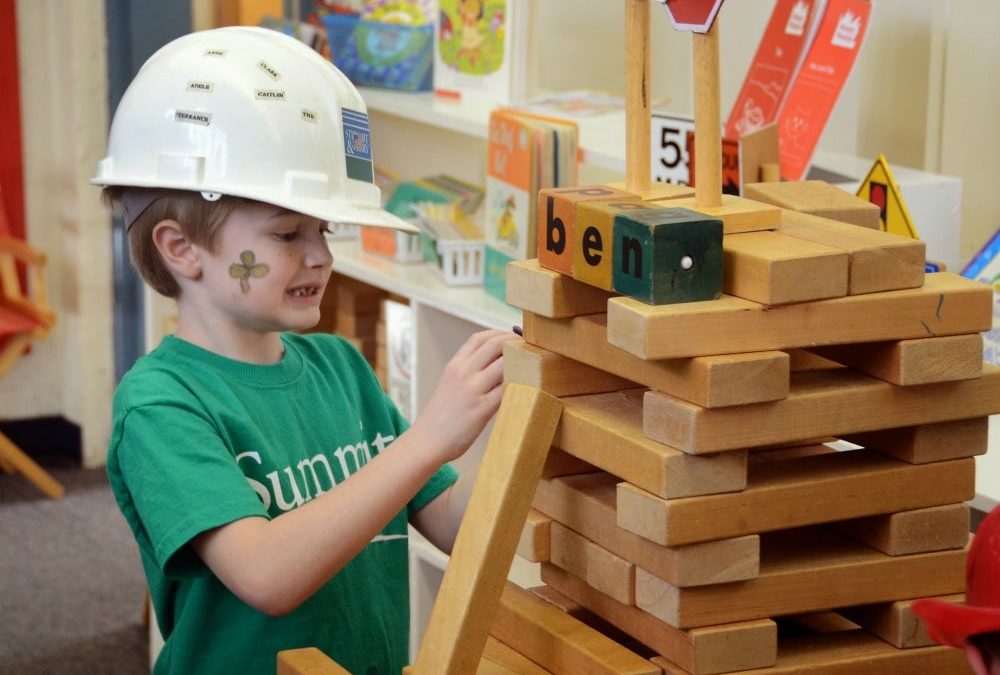By Julie Smith, Director of Lower School and Director of Parent Learning at Summit School
Kindergarten represents an important and joyful milestone for parents and children. Though many children attend some type of preschool, Kindergarten has been (and still is) the start of REAL school. So what do students need to be successful and how can parents help? Spoiler alert: Kindergarten is not about what a child knows when they get there
Popular press sends a message that arriving with mastery of skills is most important. Skills such as knowing letter names, counting numerals in order and being able to write a few words are often mentioned as important for being “ready” for kindergarten. In other words, skills seem to be valued at the top of the list. And yet, most early childhood experts, including teachers and pediatricians, believe that is only one piece of the puzzle.
Indeed, skills are an important part of Kindergarten curriculum. Yet the most successful students show up with two primary qualities: being able to manage their own behavior and being eager to learn. It’s the social and emotional skills that really pave the way for a comfortable and joyful transition from preschool child to Kindergarten student. This has been researched and documented over a long period of time.
Parents should be very curious and open minded when choosing a program. Ask about program philosophy and to see examples of how their teachers live this in their daily routine. Experts agree that too much academic push is not right. Five year olds need freedom to explore and play. A program that holds any other view is simply not reading the current research.
You’ll notice below that the suggestions are not things for the child to do but rather ways to be. In fact, these ways of being are wonderful for adults to embrace as well. And the good news is the focusing on these brings more joy in the moment and paves the way for better relationships in the long run for parents and children.
Being Curious: Children who want to learn about the world and are good at asking questions will thrive in Kindergarten.
How can parents nurture this?
Take your child to simple interesting places and talk about it….a lot. Examples include parks, museums, and even the grocery store. Draw pictures of the experiences afterwards. Make a scrapbook or journal where you write their words. Record their voices retelling their experience.
Being in Love With Books: Being read aloud to is one of the best predictors of becoming a good reader. Children also pick up patterns of oral language and increase vocabulary in a relaxed, fun way.
How can parents nurture this?
Read together. Read picture books to your child with rich vocabularies. Research shows that strong vocabularies lead to future academic success. As you read together, ask your child, “what do you think will happen next?” Tell stories out loud. Visit libraries and bookstores. Listen to books on CD. Develop a love of literature that will last a lifetime.
Being Able to Express Their Ideas, Thoughts and Feelings Children that are read to often pick up patterns of oral language and increase vocabulary in a fun and natural way. Expressive language allows the child to navigate kindergarten interactions with peers and teachers.
How can parents nurture this?
Ask interesting questions. Instead of broad questions like “How was your day?” get more specific like, “Did anything unusual happen today?” The best questions open up conversation beyond yes or no. “Tell me more about that” is a good response to bits of information your child shares with you. Beginning conversations with your child while doing an activity together like cooking, coloring or taking a walk often opens the door to rich conversation
Being an Attentive Listener: Being able to sit and listen long enough to be instructed is another key and monitor one’s behavior during the school day in line, on the playground, in circle time and during instruction
How can parents nurture this?
Play games that require taking turns. Teach delayed gratification. Monitor the pace of your child’s life. Next time your child begs for a toy ask them to wait—or better yet, buy a book instead. See above about building a strong reader.
Being Empathetic: Being able to see another persons point of view
How can parents nurture this?
Show empathy for others on a daily basis. During playdates, listen without jumping to intervene when peer conflicts arise (they will, they are normal). It is best to learn to be patient and wait to see if the situation really needs your help. Simply talk through the situation causing the controversy with your child. Intervene with your own curiosity….“I wonder if the two of you can find a way to take turns with this toy?”
Lastly, aim to be fully present with and embrace the natural joy that emanates from your preschool child. It is a brief, fleeting stage where your child wants to follow you about and be with you most of the time. Enjoy the journey!

















Judith Kuhn’s book about knowing whether or not your child is ready for Kindergarten is excellent and goes right along with this advice. I highly recommend it.
Photo by Martin Tucker – Summit School
Excellent advice! As a former teacher and mother of an almost Kindergartener, this is right on point! Thank you for the reminders.